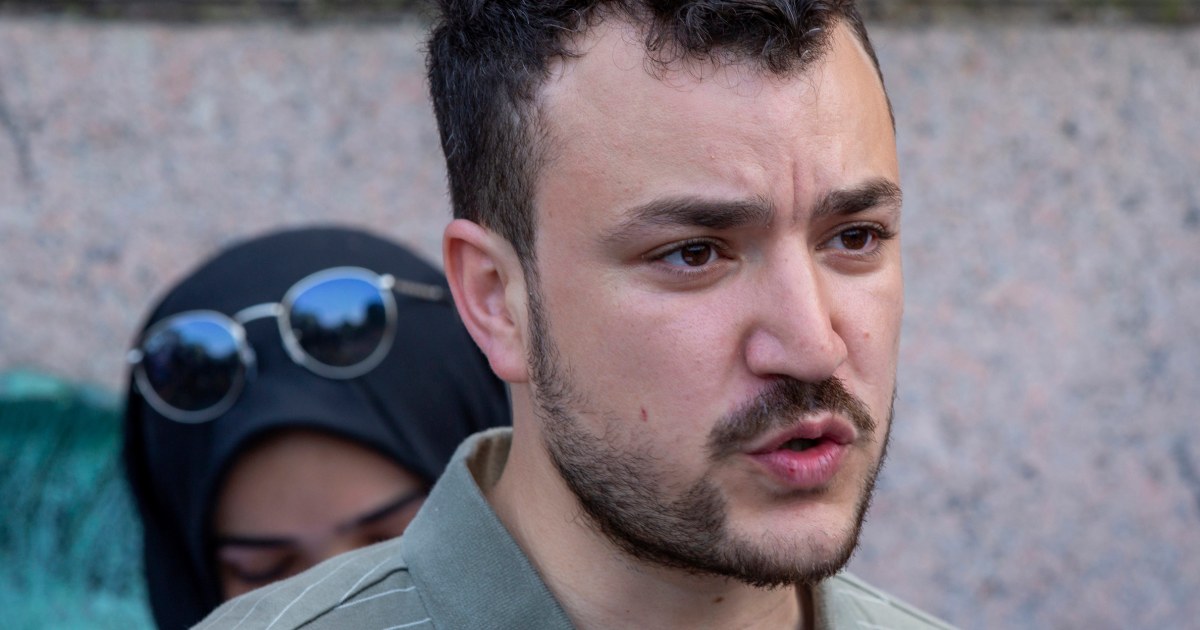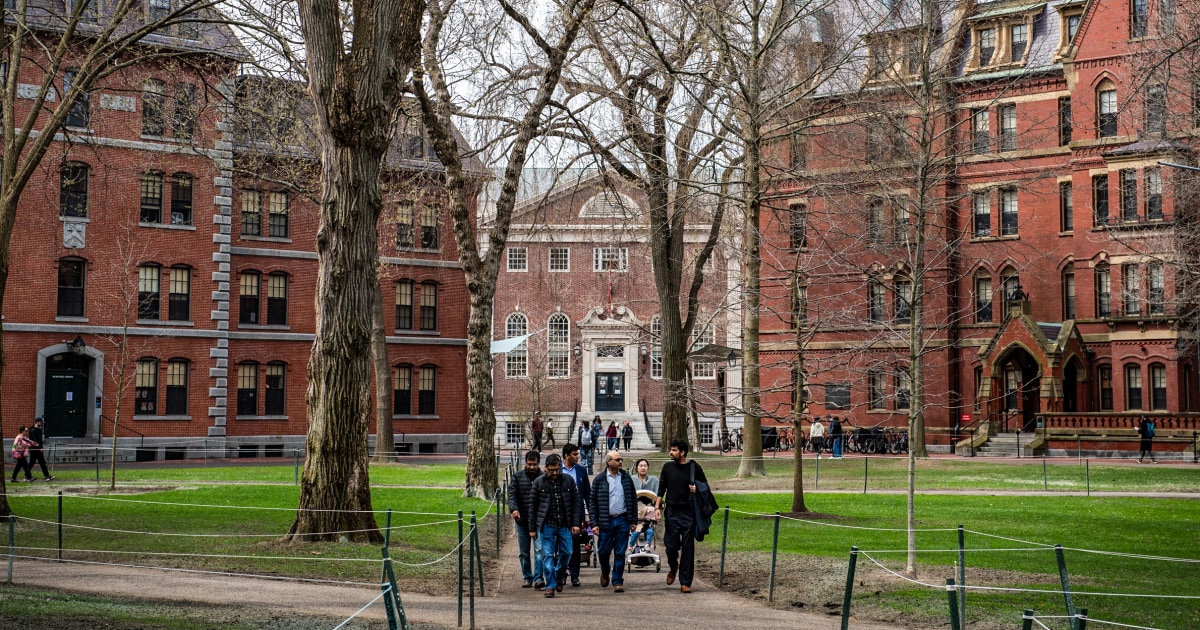Education
ICE arrests Palestinian activist who helped lead Columbia University protests, lawyer says

Federal immigration authorities arrested a Palestinian graduate student who played a prominent role in protests against Israel at Columbia University, according to his attorney.
Mahmoud Khalil was inside a university-owned residence Saturday night near Columbia’s Manhattan campus when several Immigration and Customs Enforcement agents entered his apartment and took him into custody, his attorney, Amy Greer, told The Associated Press.
Greer said she spoke by phone with one of the ICE agents during the arrest, who said they were acting on State Department orders to revoke Khalil’s student visa. Informed by the attorney that Khalil was in the United States as a permanent resident with a green card, the agent said they were revoking that too, according to the lawyer.
The arrest appears to be among the first known actions under President Donald Trump’s pledge to deport international students who joined the protests against the war in Gaza that swept college campuses last spring. His administration has claimed participants forfeited their rights to remain in the country by supporting Hamas, a terror organization.
When ICE agents arrived at the campus building Saturday, they also threatened to arrest Khalil’s wife, an American citizen who is eight months pregnant, Greer said. The authorities declined to say why Khalil was being arrested, according to the attorney.
They were initially told he was transferred to an immigration detention facility in Elizabeth, New Jersey. But when Khalil’s wife tried to visit Sunday, she learned he was not there — and may have been transferred as far away as Louisiana, Greer said.

“We have not been able to get any more details about why he is being detained,” Greer told the AP. “This is a clear escalation. The administration is following through on its threats.”
In a statement to NBC News on Sunday, Department of Homeland Security spokesperson Tricia McLaughlin said Khalil was arrested in coordination with ICE and the State Department “in support of President Trump’s executive orders prohibiting anti-Semitism.”
“Khalil led activities aligned to Hamas, a designated terrorist organization,” McLaughlin said.
A Columbia spokesperson said law enforcement agents must produce a warrant before entering university property, but declined to say if the school had received one ahead of Khalil’s arrest. The spokesperson also declined to comment on Khalil’s detention.
Messages seeking comment were left Sunday with the State Department and ICE.
In a message shared on X Sunday evening, Secretary of State Marco Rubio said the administration “will be revoking the visas and/or green cards of Hamas supporters in America so they can be deported.”
DHS can initiate deportation proceedings against green card holders for a broad range alleged criminal activity, including supporting a terror group. It would ultimately be up to an immigration judge to revoke someone’s permanent resident status, according to Camille Mackler, founder of Immigrant ARC, a coalition of legal service providers in New York.
“This has the appearance of a retaliatory action against someone who expressed an opinion the Trump administration didn’t like,” Mackler said.
Khalil served as a negotiator for students as they bargained with university officials over an end to the tent encampment erected on campus last spring, a role that made him one of the most visible activists in support of the movement.
He was also among those under investigation by a new Columbia University office that has brought disciplinary charges against dozens of students for their pro-Palestinian activism, according to records shared with the AP.
The investigations come as the Trump administration has followed through on its threat to cut hundreds of millions of dollars in funding to Columbia because of what the government describes as the Ivy League school’s failure to squelch antisemitism on campus.
The university’s allegations against Khalil focused on his involvement in the Columbia University Apartheid Divest group. He faced sanctions for potentially helping to organize an “unauthorized marching event” in which participants glorified Hamas’ Oct. 7, 2023, attack and playing a “substantial role” in the circulation of social media posts criticizing Zionism, among other acts of alleged discrimination.
“I have around 13 allegations against me, most of them are social media posts that I had nothing to do with,” Khalil told the AP last week.
“They just want to show Congress and right-wing politicians that they’re doing something, regardless of the stakes for students,” he added. “It’s mainly an office to chill pro-Palestine speech.”
Education
Judge orders detained Tufts student Rumeysa Öztürk to be transferred back to Vermont

A federal judge on Friday ordered that the Tufts University student who wrote an essay about Israel and the war in Gaza and is now fighting deportation must be transferred back to Vermont.
Judge William K. Sessions III stayed his order for four days to give the government a chance to appeal.
Rumeysa Öztürk, a 30-year-old Turkish national in the United States on a visa, is being held at an Immigration and Customs Enforcement detention center in Louisiana.
In Friday’s ruling, the judge refused efforts by the government to dismiss her habeas petition.
He found that Öztürk “has raised significant constitutional concerns with her arrest and detention.”
The Tufts doctoral student was arrested March 25 in Somerville, Massachusetts, and the Department of Homeland Security has accused her of engaging “in activities in support of Hamas.”
She co-wrote an opinion essay in 2024 for the student newspaper that called on Tufts to “acknowledge the Palestinian genocide,” which the undergraduate student government had demanded in a resolution.
The essay criticized university leadership for its response to the student government’s resolutions that it “disclose its investments and divest from companies with direct or indirect ties to Israel.”
“A university op-ed advocating for human rights and freedom for the Palestinian people should not lead to imprisonment,” one of her attorneys, Mahsa Khanbabai, said Friday. “Our immigration laws should not be manipulated to rip people away from their homes and their loved ones.”
Öztürk’s attorneys called Friday’s ruling a victory, and said that the federal government was trying to manipulate where her case would be heard so that it could try for its preferred outcome.
Friday’s ruling allows Öztürk to remain in ICE custody in Vermont while her habeas petition, which challenges her detainment, proceeds in federal court, as well as her removal case in immigration court in Louisiana.
The Department of Justice declined to comment Friday.
Öztürk is one of a number of international students in the U.S. on visas who the Trump administration is trying to deport for their actions protesting the conduct of Israel in its war against Hamas in Gaza, which it launched after the Hamas attacks on Israel on Oct. 7, 2023.
Tufts University has defended Öztürk and has petitioned that she be released from custody. The university said the opinion essay did not violate its policies and was in accordance with its position on free speech.
“The University has no further information suggesting that she has acted in a manner that would constitute a violation of the University’s understanding of the Immigration and Naturalization Act,” the university leadership said in a declaration earlier this month.
Education
Harvard’s battle with the Trump administration is creating a thorny financial situation

Harvard’s brewing conflict with the Trump administration could come at a steep cost — even for the nation’s richest university.
On April 14, Harvard University President Alan Garber announced the institution would not comply with the administration’s demands, including to “audit” Harvard’s students and faculty for “viewpoint diversity.” The federal government, in response, froze $2.2 billion in multi-year grants and $60 million in multi-year contracts with the university.
According to CNN and multiple other news outlets, the Trump administration has now asked the Internal Revenue Service to revoke Harvard’s tax-exempt status. If the IRS follows through, it would have severe consequences for the university. The many benefits of nonprofit status include tax-free income on investments and tax deductions for donors, education historian Bruce Kimball told CNBC.
Bloomberg estimated the value of Harvard’s tax benefits in excess of $465 million in 2023.
Nonprofits can lose their tax exemptions if the IRS determines they are engaging in political campaign activity or earning too much income from unrelated activities. Few universities have lost their non-profit status. One of the few examples was Christian institution Bob Jones University, which lost its tax exemption in 1983 for racially discriminatory policies.
White House spokesperson Harrison Fields told the Washington Post that the IRS started investigating Harvard before President Donald Trump suggested on Truth Social that the university should be taxed as a “political entity.” The Treasury Department did not reply to a request for comment from CNBC.
A Harvard spokesperson told CNBC that the government has “no legal basis to rescind Harvard’s tax exempt status.”
“The government has long exempted universities from taxes in order to support their educational mission,” the spokesperson wrote in a statement. “Such an unprecedented action would endanger our ability to carry out our educational mission. It would result in diminished financial aid for students, abandonment of critical medical research programs, and lost opportunities for innovation. The unlawful use of this instrument more broadly would have grave consequences for the future of higher education in America.”
The federal government has challenged Harvard on yet another front, with the Department of Homeland Security threatening to stop international students from enrolling. The Student and Exchange Visitor Program is administered by Immigration and Customs Enforcement, which falls under the DHS.
International students make up more than a quarter of Harvard’s student body. However, Harvard is less financially dependent on international students than many other U.S. universities as it already offers need-based financial aid to international students in its undergraduate program. Many other universities require international students to pay full tuition.
The Harvard spokesperson declined to comment to CNBC on whether the university would sue the administration over the federal funds or any other grounds. Lawyers Robert Hur of King & Spalding and William Burck of Quinn Emanuel are representing Harvard, stating in a letter to the federal government that its demands violate the First Amendment.
Harvard, the nation’s richest university, has more resources than other academic institutions to fund a long legal battle and weather the storm. However, its massive endowment — which has raised questions during the recent developments — is not a piggy bank.
Why Harvard’s endowment is so large
Harvard has an endowment of nearly $52 billion, averaging $2.1 million in endowed funds per student, according to a study by the National Association of College and University Business Officers, or NACUBO, and asset manager Commonfund.
That size makes it larger than than the GDP of many countries.
The endowment generated a 9.6% return last fiscal year, which ended June 30, according to the university’s latest annual report.
Founded in 1636, Harvard has had more time to accumulate assets as the nation’s oldest university. It also has robust donor base, receiving $368 million in gifts to the endowment in 2024. While the university noted that more than three-quarters of the gifts averaged $150 per donor, Harvard has a history of headline-making donations from ultra-rich alumni.
Kimball, emeritus professor of philosophy and history of education at the Ohio State University, attributes the outsized wealth of elite universities like Harvard to a willingness to invest in riskier assets.
University endowments were traditionally invested very conservatively, but in the early 1950s Harvard shifted its allocation to 60% equities and 40% bonds, taking on more risk and creating the opportunity for more upside.
“Universities that didn’t want to assume the risk fell behind,” Kimball told CNBC in March.
Other universities soon followed suit, with Yale University in the 1990s pioneering what would become the “Yale Model” of investing in alternative assets like hedge funds and natural resources. Though it proved lucrative, only universities with large endowments could afford to take on the risk and due diligence that was needed to succeed in alternative investments, according to Kimball.
According to Harvard’s annual report, the largest chunks of the endowment are allocated to private equity (39%) and hedge funds (32%). Public equities constitute another 14% while real estate and bonds/TIPs make up 5% each. The remainder is divided between cash and other real assets, including natural resources.
The university has made substantial portfolio allocation changes over the past seven years, the report notes. The Harvard Management Company has cut the endowment’s exposure to real estate and natural resources from 25% in 2018 to 6%. These cuts allowed the university to increase its private equity allocation. To limit equity exposure, the endowment has upped its hedge fund investments.
The endowment is not a piggy bank
University endowments, though occasionally staggering in size, are not slush funds. The pools are actually made up of hundreds or even thousands of smaller funds, the majority of which are restricted by donors to be dedicated to areas including professorships, scholarships or research.
Harvard has some 14,600 separate funds, 80% of which are restricted to specific purposes including financial aid and professorships. Last fiscal year, the endowment distributed $2.4 billion, 70% of which was subject to donors’ directives.
“Most of that money was put in for a specific purpose,” Scott Bok, former chairman of the University of Pennsylvania, told CNBC in March. “Universities don’t have the ability to break open the proverbial piggy bank and just grab the money in whatever way they want.”
Some of these restrictions are overplayed, according to former Northwestern University President Morton Schapiro.
“It’s true that a lot of money is restricted, but it’s restricted to things you’re going to spend on already like need-based aid, study abroad, libraries,” Bok said previously.
How Harvard is shoring up its finances
Harvard has $9.6 billion in endowed funds that are not subject to donor restrictions. The annual report notes that “while the University has no intention of doing so,” these assets “could be liquidated in the event of an unexpected disruption” under certain conditions.
Liquidating $9.6 billion in assets, nearly 20% of total endowed funds, would come at the cost of future cash flow, as the university would have less to invest.
Harvard did not respond to CNBC’s queries about increasing endowment spending. Like most universities, it aims to spend around 5% of its endowment every year. Assuming the fund generates high-single-digit investment returns, spending just 5% allows the principal to grow and keep pace with inflation.
For now, Harvard is taking a hard look at its operating budget. In mid-March, the university started taking austerity measures, including a temporary hiring pause and denying admission to graduate students waitlisted for this upcoming fall.
Harvard is also issuing $750 million in taxable bonds due September 2035. This past February, the university issued $244 million in tax-exempt bonds. A slew of universities including Princeton and Colgate are also raising debt this spring.
So far, Moody’s has not updated its top-tier AAA rating for Harvard’s bonds. However, when it comes to higher education as a whole, the ratings agency isn’t so optimistic, lowering its outlook to negative in March.
Education
Trump admin threatens to stop Harvard from enrolling foreign students

The Trump administration is continuing its battle against Harvard University — this time, canceling $2.7 million in grants and threatening to stop the enrollment of international students.
Homeland Security Secretary Kristi Noem on Wednesday announced the cancellation of two DHS grants to the school, declaring it “unfit to be entrusted with taxpayer dollars.”
Noem also said she sent a letter to Harvard demanding “detailed records” on foreign student visa holders’ “illegal and violent activities” by April 30.
If Harvard does not meet that deadline, it’ll immediately lose its Student and Exchange Visitor Program certification, she warned.
The release alleged Harvard’s foreign visa holders participated in riots and spewed antisemitic hate targeting Jewish students following the Hamas incursion against Israel on Oct. 7, 2023.
“If Harvard cannot verify it is in full compliance with its reporting requirements, the university will lose the privilege of enrolling foreign students,” a DHS news release said.
The two canceled grants were: an $800,303 grant for Implementation Science for Targeted Violence Prevention, which Noem said “branded conservatives as far-right dissidents in a shockingly skewed study,” and a $1.9 million Blue Campaign Program Evaluation and Violence Advisement grant that Noem alleged “funded Harvard’s public health propaganda.”
“Harvard bending the knee to antisemitism — driven by its spineless leadership — fuels a cesspool of extremist riots and threatens our national security,” Noem said in a statement. “With anti-American, pro-Hamas ideology poisoning its campus and classrooms, Harvard’s position as a top institution of higher learning is a distant memory. America demands more from universities entrusted with taxpayer dollars.”
It’s the latest punch by the Trump administration against the nation’s most prestigious university.
Earlier this week, the Trump administration announced that it would freeze more than $2 billion in grants to Harvard after the institution refused to accept demands that included auditing the viewpoints of its student body. Trump has also called for Harvard to lose its tax-exempt status.
On Monday, Harvard University’s lawyers sent a letter rejecting a list of demands from the Trump administration. In a statement posted online, Harvard President Alan Garber referred to the demands as “an attempt to control the Harvard community” and vowed to fight back.
A Harvard spokesperson told NBC News on Thursday that the school will “not surrender its independence or relinquish its constitutional rights,” while complying with the law.
-

 Education1 day ago
Education1 day agoHarvard’s battle with the Trump administration is creating a thorny financial situation
-

 Sports2 days ago
Sports2 days agoAaron Rodgers ‘not holding anybody hostage’ as he decides his future, retirement a possibility
-

 Middle East8 hours ago
Middle East8 hours agoIran says progress in nuclear talks with US, confirms third round next week | News
-

 Europe1 day ago
Europe1 day agoTrump’s ‘lone ranger’: How Steve Witkoff became the defacto point man on America’s foreign policy challenges
-

 Lifestyle1 day ago
Lifestyle1 day agoSweets from the sky! A helicopter marshmallow drop thrills kids in suburban Detroit
-

 Lifestyle2 days ago
Lifestyle2 days agoThousands of pilgrims trek through New Mexico desert to historic adobe church for Good Friday
-

 Europe1 day ago
Europe1 day agoThe Trump administration says Europe is taking advantage of the US. That’s not exactly true
-

 Conflict Zones1 day ago
Conflict Zones1 day agoTrump says US may ‘pass’ on helping end war if Russia, Ukraine resist deal | Russia-Ukraine war News



